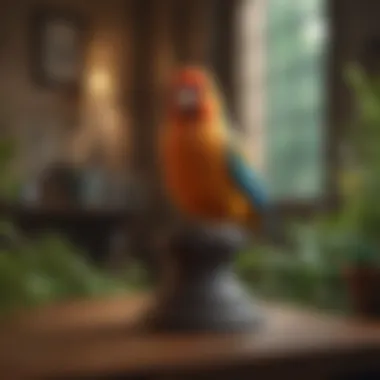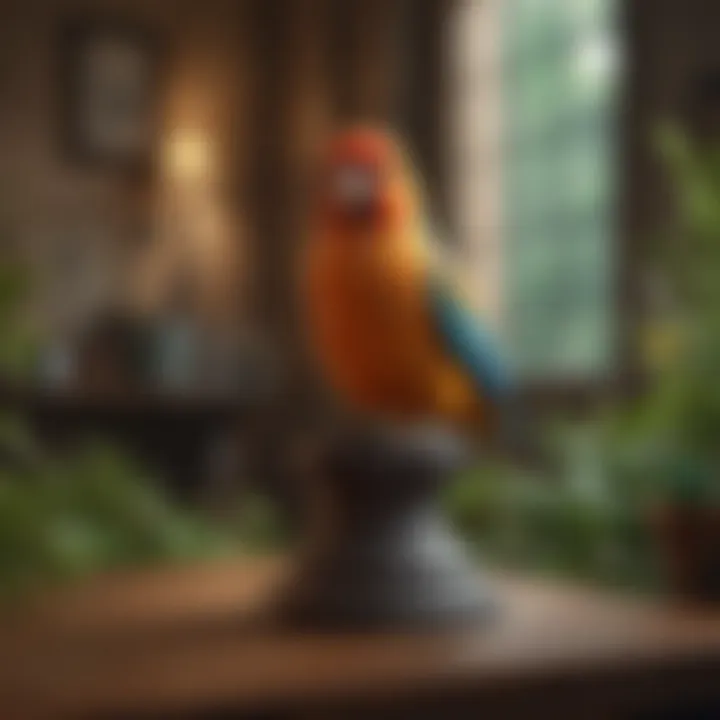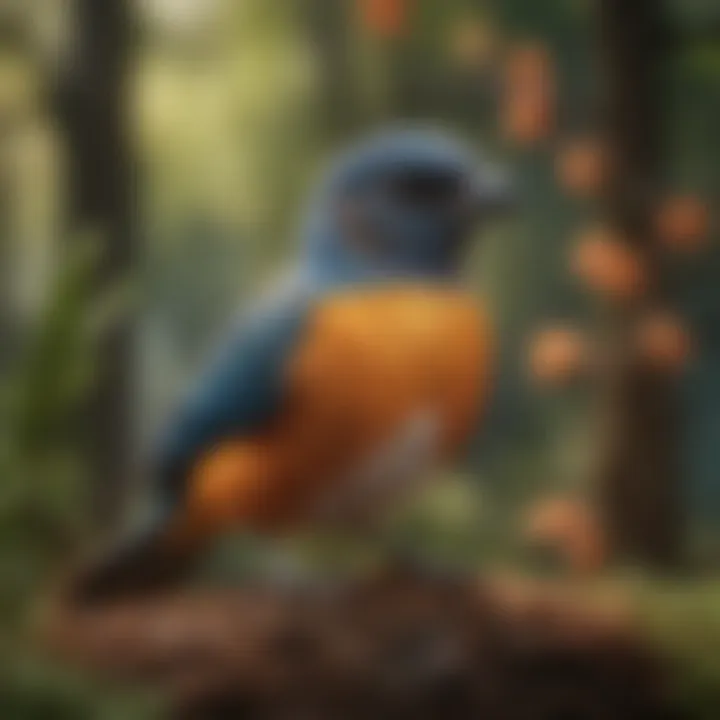Exploring Pet Bird Feng Shui for a Harmonious Home


Intro
Creating a well-balanced space for pet birds is essential for their overall health and well-being. The concept of feng shui, originating from ancient Chinese philosophy, focuses on the arrangement and organization of spaces to promote positive energy flow. By integrating these principles into the care of avian companions, owners can enhance their birds' living environments. This guide delves into practical applications of feng shui for pet birds, offering insights that encompass care tips, behavioral insights, nutrition, wellness, and enriching activities. Each aspect contributes to an ideal living space that fosters harmony, joy, and vitality, both for the birds and their human caretakers.
Care Tips
Daily Care Routines
Daily routines are crucial for the well-being of pet birds. Begin each day by engaging with your birds. This interaction can include talking softly, singing, or offering treats. Regular schedules also help establish a sense of security for birds. Feed them at the same times each day, and ensure access to fresh water.
Cage Setup and Maintenance
The cage is the core of a bird's habitat and should be thoughtfully arranged. Position the cage in a location that receives natural light but avoids direct sunlight during peak hours. Balance space within the cage by including perches at varying heights to encourage movement. Avoid placing the cage in high-traffic areas to reduce stress from loud noises or sudden movements. Maintaining a clean cage is essential. Remove old food, debris, and waste daily to prevent illness.
Hygiene and Cleaning Practices
Cleanliness is paramount in bird care. Use non-toxic cleaners to wipe down surfaces inside and outside the cage. Regularly disinfect water sources and food bowls to minimize the risk of infections. Weekly thorough cleaning is advisable, ensuring that all items within the cage are sanitized and that the bottom is free from any remnants.
Seasonal Care Adjustments
Birds may require adjustments based on seasonal changes. In colder months, ensure adequate warmth by providing insulated areas. Conversely, during summer, maintain a cool environment through proper ventilation. Seasonal feather molting may also necessitate changes in diet to support their nutritional needs. Monitoring temperature and airflow contributes to a comfortable habitat throughout the year.
Behavioral Insights
Understanding Bird Body Language
Birds communicate primarily through body language. Observing their postures and movements helps in understanding their mood. Fluffed up feathers may indicate discomfort or illness, while a relaxed stance signifies well-being. Moreover, vocalizations can express happiness or distress, providing valuable insights.
Common Behavioral Issues and Solutions
Common issues in pet birds include excessive screaming, feather plucking, and aggression. Identifying triggers is the first step for resolving these problems. For example, boredom can lead to sounds and destructive behavior. Address this with interactive toys and adequate social interaction to mitigate such problems.
Positive Reinforcement Techniques
Training birds with positive reinforcement encourages desired behaviors. Rather than punishing unwanted behavior, reward them for good conduct. Treats or verbal praise can strengthen bonds. This method enhances learning and creates a more positive atmosphere.
Social Interaction Needs
Birds are social creatures requiring interaction, whether with their human companions or with other birds. Neglecting their social needs may lead to loneliness and psychological issues. Schedule regular playtime outside the cage and consider multi-bird households for added companionship.
Nutrition Guides
Essential Diet Components
A balanced diet is vital for pet birds. Incorporate high-quality pellets as a staple, supplemented with fresh fruits and vegetables. Varieties like carrots, spinach, and apples provide essential nutrients. Seeds can be given as occasional treats but should not form the bulk of their diet.
Safe and Toxic Foods
Knowing which foods are safe versus toxic is crucial. Foods such as chocolate, avocado, and caffeine can be harmful. Always research or consult an avian veterinarian if unsure about a specific food item for safety.
Supplements and Treats
Occasional treats enhance diet variety but should be offered in moderation. Supplements like calcium can support health, especially during breeding or molting. Consult with a veterinarian to determine the appropriate types and dosages for specific bird species.
Feeding Strategies for Different Species
Feeding approaches should cater to the specific needs of various bird species. Budgerigars, for instance, have different dietary requirements compared to larger species like cockatoos. Understanding these nuances is fundamental in avian nutrition to ensure optimal health.
Wellness and Health
Routine Health Checkups
Regular veterinary check-ups are essential for preventive care. Schedule exams at least annually, ensuring vaccinations are up to date. Early detection of potential health issues can significantly improve outcomes, enhancing your bird’s quality of life.
Identifying Symptoms of Illness
Awareness of health symptoms is necessary. Changes in eating habits, lethargy, or unusual droppings may indicate health issues. Immediate veterinary consultation is encouraged when such symptoms arise.
Preventative Care and Vaccinations
A comprehensive care regime includes vaccinations, parasite control, and proper hygiene. Vaccination can protect birds from prevalent avian diseases. Additionally, keeping the living environment clean minimizes exposure to pathogens.
Mental and Emotional Well-being
Fostering mental health is crucial for birds. Engage in regular interactive play, encourage foraging behavior, and introduce new toys regularly to stimulate their minds. A mentally healthy bird is often a happier bird, leading to better overall health.
Enriching Activities
Toys and Playtime Ideas
Toys are not just for entertainment; they are essential for mental stimulation. Rotate toys frequently to keep birds engaged. Materials like wood, rope, and paper encourage chewing and exploration, which mimic natural behaviors.
Training and Tricks


Training is an opportunity to bond with your birds. Start with simple commands, rewarding their successes with praise or treats. This not only teaches the bird but enhances the human-animal relationship.
Outdoor Activities and Interaction
Supervised outdoor time can give birds fresh air and new experiences. Utilizing aviator harnesses allows safe exploration while fostering curiosity about their environment. Ensure the outdoor area is free from potential hazards like predators or toxic plants.
DIY Projects for Mental Stimulation
Engaging in DIY projects for birds can provide hours of fun. Create foraging toys by hiding treats in paper bags, or build a simple perch using branches. These activities stimulate creativity and offer birds a chance to play with their food.
Incorporating feng shui can optimize not only the physical space but also the emotional landscape for your pet birds. Well-considered arrangements and practices can greatly contribute to their happiness and well-being.
Understanding Feng Shui
Feng Shui is a practice that involves arranging one's environment to promote a balanced flow of energy, also known as "Chi." Understanding Feng Shui becomes crucial for pet bird owners who seek to enhance the living spaces for their avian companions. It focuses on the arrangement of one's home in a way that supports the well-being of both the birds and their humans. The importance of Feng Shui lies in its ability to create harmonious living spaces that can lead to improved mood, health, and behavior for the birds.
The Basics of Feng Shui
At its core, Feng Shui is about energy flow. The positioning of furniture, decorations, and even the bird cages themselves can influence the dynamics of energy in a space. This stems from the belief that everything has an energy that can either enhance or impede the well-being of those living in that environment. For pet birds, this means ensuring that their cages are not just placed for convenience but rather positioned to create a tranquil space that nurtures their health.
Some fundamental principles include:
- Ch’i (Qi): The life force that flows through all living things.
- Yin and Yang: The duality that represents balance and the interconnectedness of all elements in an environment.
- The Five Elements: These are wood, fire, earth, metal, and water, and they play a significant role in how energy interacts in a space.
By grasping the basics of Feng Shui, bird owners can establish a more harmonious setting that caters to the physical and psychological needs of their birds.
Historical Context
Feng Shui has its roots in ancient Chinese philosophy, spanning thousands of years. Initially, it was a system used in architecture and city planning, meant to harmonize human existence with the surrounding environment. Over time, the principles of Feng Shui evolved to encompass not only structures but also how to create balanced spaces within homes.
It is noteworthy that Feng Shui incorporates various cultural elements and has diversified into different schools of thought. The Western practice often includes modern interpretations, merging traditional techniques with contemporary interior design. Understanding the historical context of Feng Shui provides insight into its application for pet birds, showing how time-tested methods can lead to better environments for our feathered friends.
The Philosophy Behind Feng Shui
The philosophy of Feng Shui revolves around the idea that every element in a living space has significance and affects the quality of life. This philosophy extends to pet birds, whose instinctual nature reflects their surroundings. A space that feels good is one where energy flows freely, which is essential for both humans and animals alike.
The guiding tenet is to create a sanctuary that encourages relaxation, happiness, and health. In a way, applying Feng Shui principles can significantly influence a bird’s environment and their overall mood. Birds often mirror their feelings in their behavior; thus, a harmonious space can yield a calmer, more engaged pet.
Relevance of Feng Shui to Pet Birds
Feng Shui is a rich tradition focused on arranging spaces to promote balance and harmony. When applied to pet birds, it becomes crucial in ensuring their overall well-being. The environment in which birds live significantly impacts their behavior, mood, and health. This section delves into the importance of Feng Shui, highlighting how it can specifically benefit pet birds and their owners.
Feng Shui and Animal Well-Being
Understanding the connection between Feng Shui and the well-being of birds can profoundly change how we approach their care. Birds are sensitive creatures that react to their surroundings. The arrangement of their space, including cage placement and decor, influences their comfort level. Here are some key points to consider:
- Energy Flow: Birds require a space where energy can flow freely. A cage placed in a corner may create stagnation, causing stress. Ensure their cages are in communal areas where they can see activity without feeling overwhelmed.
- Safety and Security: Birds must feel safe. Their habitat should be well-structured, avoiding clutter that may create fear or anxiety. A clean space promotes peace.
- Natural Light and Air Circulation: Well-lit and ventilated environments are essential for physical health. Sunlight can also aid in regulating their circadian rhythms, which is vital for birds' well-being.
Implementing Feng Shui can lead to positive outcomes in the physical and emotional health of your pet birds. By focusing on their environment holistically, bird owners can create a sanctuary that nurtures their companions.
Creating a Positive Energy Space
Creating a positive energy space goes beyond mere aesthetics. It is about crafting an environment that resonates with the needs of birds while facilitating a harmonious atmosphere for owners. Here are elements to consider when creating this energy space:
- Placement of Cages: Cages should be placed at an eye level reachable for interaction. Avoid placing them in high traffic zones or near sources of negative energy, such as entrances or cluttered corners.
- Natural Elements: Introducing plants can enhance energy. Plants like Pothos or Spider plants are generally safe, as they not only improve air quality but also create a more natural habitat.
- Sound Management: Birds are sensitive to noise. Keeping the environment calm helps in maintaining serenity. If there are loud appliances or bustling activities, consider rearranging those elements to minimize disturbance.
Creating a space where both the bird’s needs and the owner’s style align contributes to a positive living environment, ultimately improving the dynamics between the bird and its caregiver.
"Feng Shui helps to create a life filled with vitality by transforming our environments into harmonious spaces that support well-being."
Incorporating these strategies can engage pet owners to develop a deeper bond with their birds. With attention to Feng Shui principles, the results will be rewarding—an enriched and peaceful habitat for avian companions.
Key Feng Shui Elements for Bird Spaces
Incorporating feng shui within the environment for pet birds can have a significant impact on their well-being. The principles behind feng shui advocate for harmony, balance, and the flow of positive energy. Each element of feng shui can be applied intentionally to create a space that nurtures health and happiness for avian companions. By focusing on specific components such as the five elements, color utilization, and material selection, owners can address the needs of their birds while enhancing their own living spaces.
The Five Elements
The five elements of feng shui—wood, fire, earth, metal, and water—play a critical role in crafting a balanced environment for pet birds. Each element embodies different characteristics that can influence energy flow.
- Wood: This element relates to growth and vitality. Wooden cages and perches can be beneficial as they create a naturalistic setting where birds feel safe and stimulated.
- Fire: Fire represents passion and energy. Warm light sources can mimic sunlight, promoting activity for birds. Avoid placing birds near strong heat sources like radiators.
- Earth: Earth corresponds to stability and nourishment. Introduce earth tones in decor or use natural materials like ceramics for bird toys, ensuring the space feels secure.
- Metal: This element signifies clarity and precision. Metal cages or accessories can enhance the aesthetic but should be chosen thoughtfully to avoid any sharp edges that could pose harm.
- Water: Water symbolizes flow and refreshment. Consider a small fountain or bowl that birds can drink from, as it can enhance the feeling of tranquility in the environment.
This integration encourages a full spectrum of experiences for pet birds, promoting not only their physical health but also their emotional well-being.
Color and its Impact
Color choices significantly influence mood and energy within a space for birds. Certain colors can create feelings of calmness, happiness, or even alertness. Pet bird owners should consider how colors affect both the birds' behaviors and their own.
- Warm Colors: Shades of red, orange, and yellow are stimulating and may encourage more activity. However, too much of these may lead to agitation in some birds.
- Cool Colors: Blues and greens create a sense of calm. They are advisable for rest areas in the home where birds can relax and feel safe.
- Neutral Colors: These colors, such as beige or soft grays, can provide balance. They allow other, more stimulating colors to stand out without overwhelming the space.
Using color psychology effectively can enhance the experience for both owners and their avian companions.
Material Considerations
Material selection is crucial in feng shui for bird spaces. The materials used in cages, toys, and decor can influence the safety and harmony of the environment.


- Natural Woods: Opt for untreated wood perches and accessories to prevent exposure to harmful chemicals. Birds prefer natural textures that simulate their natural habitats.
- Non-Toxic Paints: If decorating or painting, ensure the product is bird-safe and free from harmful substances. Avoid strong smells from fresh paint, as they may irritate birds.
- Metal Cages: While metal cages are commonly used, ensure they are stainless steel or powder-coated to avoid rusting and leaching chemicals.
- Textiles: If using fabric items, select those made from natural fibers. Avoid synthetic textiles as they can contain harmful chemicals.
By carefully considering materials, bird owners can create a safe and harmonious space that significantly contributes to the overall well-being of their feathered companions.
Using the principles of feng shui can create not only a beautiful environment but also a supportive and thriving habitat for birds.
Spatial Arrangement for Bird Cages
The spatial arrangement of bird cages plays a critical role in enhancing the well-being of pet birds. Proper arrangement not only influences the physical space but also affects the emotional and psychological health of the birds. A good layout considers visual access, energy flow, and the overall environment surrounding the cage.
Understanding how this arrangement impacts a bird's behavior is essential. Birds are sensitive to their surroundings, and the position of their cage can prevent stressors or create a more inviting space. Aspiring bird owners and breeders must embrace the significance of spatial setup as a priority in their bird-keeping practices.
Optimal Placement of Cages
When looking to enhance the living situation for birds, optimal cage placement is essential. Cages should ideally be located in areas with natural light but away from direct sunlight that can overheat. A spot that offers visibility of family activities or where the bird can see out a window will simulate natural conditions that enrich the bird's life. This placement allows them to engage with their environment and reduces feelings of isolation.
Placement on an elevated surface is often suggested, as birds in nature tend to inhabit higher perches. Furthermore, ensuring that the cage is away from high-traffic areas is necessary to diminish stress caused by constant movement and noise. However, cages should not be in complete isolation, as this could lead to loneliness.
Avoiding Negative Energy Traps
In the context of Feng Shui, negative energy traps can be defined as areas that disrupt the flow and create discomfort for your pet birds. It is crucial to assess the environment surrounding the cage. Avoid placing the cage near harsh, active elements such as electronic devices or cluttered spaces, which can disturb the tranquility needed for a harmonious environment.
Common issues include:
- Overhead Cages: Always ensure that the cage is not under beams or busy ceiling fans, as these elements can create an oppressive atmosphere.
- Direct Line to Doors: Cages directly facing doors may lead to unpredictable energy from people entering and exiting.
- Corner Placement: Avoid placing the cage in corners, as this can restrict energy flow, leaving birds feeling trapped.
By consciously arranging the cages and avoiding these negative energy traps, owners can significantly enhance their bird’s happiness and overall quality of life. Prioritizing a positive environment aligns with the core principles of Feng Shui, fostering a nurturing atmosphere for pet birds.
Enhancing Living Spaces for Birds
Enhancing living spaces for birds is a fundamental aspect of applying feng shui principles in avian care. The environment in which a bird resides plays a critical role in its overall well-being, affecting its behavior, mood, and health. Integrating natural elements, creating harmonic conditions, and adhering to thoughtful decorative guidelines can significantly benefit not only the birds but also the owners.
Incorporating Natural Elements
Natural elements are vital for promoting a healthy atmosphere. Birds instinctively thrive in environments that mimic their habitats in nature. Utilizing plants, natural materials, and sunlight can enhance their spaces effectively. Consider adding potted plants like spider plants or peace lilies. These species not only purify indoor air but also provide a sense of nature within the home.
Additionally, natural wood perches should be prioritized over plastic. They offer better grip and comfort. Mineral blocks or cuttlebones are useful additions, offering birds a place to exercise their beaks while deriving essential nutrients. Furthermore, access to natural light is essential for maintaining healthy feathers and stimulating natural instincts.
Creating a Harmonic Environment
A harmonic environment helps balance energy flow, which is crucial for the bird's comfort. This can be achieved by observing the layout and materials used in their living space. For example, the arrangement of the bird's cage should allow for unobstructed views and easy access to their favorite activities.
To facilitate positive energy, avoid positioning cages near sources of loud noise or extreme temperatures. Soft backgrounds and gentle colors can also be beneficial in creating a serene space. Opt for colors like soft blues or greens, which are calming and encourage relaxation.
Incorporating play gym areas can also support a harmonic atmosphere. These areas allow birds to interact and engage with their surroundings, promoting physical and mental health.
Decorative Guidelines for Avian Enjoyment
Decorating bird spaces is not merely an exercise in aesthetics; it plays a crucial role in ensuring a positive experience for the avian residents. Begin with selecting appropriate toys. Rotating these toys regularly keeps the environment engaging and stimulates mental activity. Consider hanging decorations that sway or move slightly. This can intrigue birds and encourage exploration.
Bird-safe materials should dominate the decorative choices. Avoid items that may be toxic, such as certain paints or synthetic fibers. Use natural fabrics or untreated wood whenever possible.
Here are some guidelines to consider when decorating:
- Bright colors but not too overwhelming: Birds are attracted to vibrancy, yet overwhelming colors can lead to stress.
- Keep it simple and spacious: Clutter can disrupt the flow of energy. Ensure there is ample space for birds to move around freely.
- Avoid sharp edges or toxic items: Safety should always be the priority in the living space.
A well-designed avian space not only enhances the quality of life for your birds but also creates a visually pleasant environment for yourself.
In summary, enhancing living spaces for birds is a multi-faceted endeavor. Incorporating natural elements, creating a harmonic atmosphere, and following decorative guidelines are all integral to promoting health and happiness among pet birds.
Behavioral Considerations
Understanding the behavioral considerations of pet birds is crucial in optimizing their environment. Pet birds are sensitive creatures, and their behaviors often reflect their surroundings. Feng Shui principles can play a significant role in shaping this environment to ensure the well-being of these avian companions.
Bird Behavior and Environment
Birds are highly perceptive animals. Their behavior is influenced by various factors, including their space, environmental stimulation, and social interaction. Key aspects of their environment, such as light, noise, and placement of the cage, can affect their mood and behavior.
- Flight Space: Adequate space to move and fly is vital. When creating a bird-friendly environment using Feng Shui techniques, consider how the placement of the cage and surrounding items allows free movement.
- Natural Light: Birds thrive in well-lit environments, with access to natural sunlight. This exposure supports their physical health and mood regulation.
- Social Interaction: Birds are social creatures that benefit from interaction, whether with their human caregivers or other birds. A harmonious setup that encourages socialization boosts their emotional well-being.
Implementing Feng Shui principles can help foster a positive atmosphere that promotes healthy behaviors. Placement of perches and toys must support their natural behaviors like chewing, climbing, and flying.
Impact of Feng Shui on Avian Mood
The mood of a pet bird can be greatly impacted by the environment it inhabits. Feng Shui focuses on creating a balanced space that nurtures positive energy, promoting a tranquil and happy state for birds.
- Calming Elements: Incorporating soothing colors or natural materials can create a serene atmosphere. For instance, soft greens and blues bring about peace, reducing stress levels in birds.
- Avoiding Clutter: A cluttered environment can lead to anxiety and restlessness in birds. Ensure that their living space is tidy and organized, adhering to Feng Shui principles which emphasize the flow of energy.
- Sound Considerations: Ambient noise can affect a bird's disposition. Keeping their space away from loud, chaotic areas promotes a calm and relaxed state.
"A harmonious environment serves as a foundation for the overall happiness and health of your pet bird."
Being mindful of these aspects allows bird owners to create environments that prioritize the emotional and mental well-being of their feathered friends. By understanding how Feng Shui influences bird behaviors and moods, caregivers can work to enrich their avian experiences effectively.
Practical Applications of Feng Shui
The application of feng shui in the context of pet birds is both meaningful and practical. It helps you create an environment that supports the well-being of your avian companions. This section emphasizes the importance of assessing both your space and the elements within it. A clear understanding of feng shui principles aids bird owners in optimizing habitats conducive to health and happiness.


Feng Shui Assessment for Bird Owners
Assessment is the first step in bringing feng shui principles to your bird's environment. Begin by evaluating the space where your bird lives or spends time. Observe how the energy flows through the room. Are there areas that feel heavy or stagnant? Identifying such areas can highlight where changes are necessary.
When looking to assess your bird's space, consider the following:
- Location of cages: Ensure they are not placed in direct line with doors or windows where abrupt energies may enter.
- Surrounding decor: Items such as mirrors or clutter can disrupt the energy flow, possibly impacting your bird's behavior.
- Sheltered zones: Areas that are well-protected can provide a sense of security for your birds, which is essential for their overall well-being.
A detailed feng shui assessment will create a strong foundation for improving your bird's environment. It enables you to pinpoint specific problems and opens up pathways for solutions.
Step-by-Step Implementation
Once the necessary assessments are done, the next step involves implementing changes based on those findings. Here is a structured approach:
- Reposition Cages: Move the bird cages to more favorable locations. Ideally, cages should be placed against a wall for protection and away from direct drafts.
- Declutter: Remove unnecessary items around the bird's space to create a serene environment. Clutter can lead to congested energy, which is not beneficial for birds.
- Incorporate Elements: Introduce natural elements like plants, which can enhance the energy of the environment. Additionally, consider bird-safe plants that are non-toxic.
- Use Color Wisely: Select colors that promote calmness and joy. Soft pastels or earthy tones are highly recommended as they can positively influence mood.
- Rotate Toys and Perches: Regularly changing toys and perches will help keep the environment stimulating and fresh, directly contributing to the overall happiness of the birds.
- Continuous Monitoring: After implementation, observe how your birds respond to the changes. Regular assessment and slight adjustments might be necessary to fully maximize the benefits of feng shui.
"A harmonious environment promotes not just the physical health of birds but also enhances their emotional well-being."
Following these steps ensures that the feng shui enhancements do not remain static but evolve according to your pet's needs. The end goal is to cultivate a nurturing space that resonates with both you and your feathered friends.
Common Mistakes in Bird Feng Shui
Understanding common mistakes in avian feng shui is crucial for enhancing the living conditions of pet birds. Poorly arranged spaces or misunderstanding feng shui principles can lead to negative energy and stress for both birds and owners. This section delves into typical pitfalls, enabling bird owners to create a harmonious environment for their pets.
Identifying Pitfalls
Recognizing the mistakes made in bird feng shui can transform an ordinary space into a nurturing one. Some common pitfalls include:
- Incorrect Cage Placement: Positioning bird cages in areas with excessive foot traffic can create stress. Birds thrive in calmer areas.
- Lack of Natural Light: Birds need natural light for their well-being. A cage in a dark corner inhibits their health.
- Overcrowded Spaces: Too many items clutter a room, disrupting the flow of energy. Birds require space to move freely and feel secure.
- Incompatible Shared Spaces: Placing a bird cage near noisy appliances or other pets may create anxiety.
Identifying these mistakes allows pet owners to refine their approach to feng shui, promoting a better environment for their avian companions.
Corrective Measures
Implementing corrective measures can significantly enhance the feng shui of bird spaces. Consider the following actions:
- Optimal Cage Location: Place the bird cage away from high-traffic areas. A corner or quiet room offers safety and stability.
- Enhance Light Exposure: Ensure the cage receives ample sunlight, but avoid direct extreme heat. Natural light is essential for avian vitality.
- Decluttering: Regularly assess the space for unnecessary items. A tidy area supports positive energy flow.
- Mindful Arrangements: Keep the cage away from potentially disruptive factors, such as loud appliances or aggressive pets. Consider the overall atmosphere of the room.
By addressing these common mistakes and applying corrective measures, bird owners can create environments that support their pet's health and happiness. Investing time in these adjustments makes a difference in the well-being of their birds.
Evaluating the Impact of Feng Shui
Evaluating the impact of Feng Shui on the living environment of pet birds is crucial for understanding how these principles affect their overall well-being. Many pet bird owners are beginning to recognize that not just food, cage type or toys influence their birds' health and happiness, but also the quality of space they inhabit. Feng Shui emphasizes harmony, balance, and the flow of energy. Applying these concepts to avian spaces can lead not only to healthier birds but also to a more enriching experience for their owners.
When assessing the impact of Feng Shui, there are several aspects to consider:
- Physical Environment: How the arrangement of furniture, lighting, and the positioning of the birdcage come together can alter the energy dynamics within the home. Proper configuration can foster an atmosphere of tranquility for both the owner and the bird.
- Bird Behavior: Observing changes in your bird’s behavior can provide immediate feedback about the effectiveness of your Feng Shui practices. Birds are sensitive to their environments. A stress-free living space can result in more active, social, and happier birds.
- Health Indicators: Subtle health indicators, such as feather condition and vocalization, will often reflect the quality of their surroundings. For instance, a stressed bird might exhibit changes in feathers or a decrease in vocal behaviors.
"The energy flow around a pet bird's environment can significantly influence its mood and health."
This connection highlights how notable changes can arise from even minor adjustments in the living space, affirming the importance of regular evaluations.
Assessing Behavioral Changes
Behavioral changes serve as a pivotal measure of how well Feng Shui has been employed in the bird's habitat. Birds are not only creatures of habit but also of sensitivity to their surroundings. Small changes in space can lead to notable shifts in their behavior.
- Signs of Relaxation: A well-balanced environment allows birds to feel secure. Indicators may include relaxed postures, spontaneous preening, and engaging with toys or interacting with their owners more positively.
- Social Interaction: Birds kept in harmonious spaces are more likely to display social behaviors, like chirping, singing, and playing actively.
- Avoidance Behavior: If a bird begins to retreat frequently or shows signs of fear, such behaviors may indicate that something in the environment is energetically off.
Monitoring these aspects regularly will help owners recalibrate the Feng Shui balance.
Long-Term Benefits
Implementing and evaluating Feng Shui practices can yield numerous long-term benefits for both pet birds and their owners. Understanding these benefits can motivate bird owners to improve their living arrangements further.
- Enhanced Well-Being: Long-term exposure to a well-arranged space can result in healthier birds with enhanced well-being. This not only benefits avian health but also strengthens the bond between the bird and its caregiver.
- Decreased Stress Levels: A positive energy flow can diminish stress levels in birds, making them less prone to health complications related to anxiety.
- Improved Lifespan: Research suggests that enriched living environments contribute to overall longevity. Birds in environments where Feng Shui is effectively practiced may enjoy longer, healthier lives.
By focusing on the details of spatial arrangement and energy balance, pet owners can cultivate an atmosphere that fosters a thriving habitat for their bird companions. This process is not only beneficial but essential for creating a sustainable and joyful coexistence.
Epilogue and Future Directions
The conclusion of this article serves as a vital touchstone for understanding how feng shui principles apply specifically to pet bird care. It not only summarizes key elements discussed but also steers the audience towards mindful application of these ideas in their own spaces. Recognizing the significance of an environment that promotes energy flow, balance, and harmony is essential for the well-being of avian companions and for enhancing the relationship between birds and their owners.
Key benefits of incorporating feng shui practices include improved mood and behavior in birds, as well as an enriching experience for the owner. It is clear that a thoughtfully arranged space fosters not only physical health but emotional connections between humans and their avian pets.
Future directions focus on the integration of emerging trends in bird-keeping with traditional feng shui practices. As bird ownership continues to evolve, the need for innovative solutions that align with both modern living and the ancient wisdom of feng shui becomes imperative.
Summarizing Key Takeaways
- The intersection of feng shui and pet bird care enhances well-being.
- Balanced energy flow contributes to improved behavior in birds.
- Attention to spatial arrangement creates a more enjoyable environment for both birds and owners.
- Mindful practices can transform the lived experience within an avian space.
Innovations in Bird Keeping
The future of bird keeping is bright with advancements that resonate with the principles of feng shui. Innovations such as smart cages that monitor environmental conditions and adjust as needed are becoming more prevalent. These technologies not only ensure a comfortable habitat for birds but also relieve owners of the burden of constant monitoring.
Sustainability is also gaining traction, with more owners opting for eco-friendly materials in their bird cages and accessories. This shift not only aligns with feng shui principles but also contributes to a healthier planet. Furthermore, community interactions among bird enthusiasts are on the rise, providing platforms for shared knowledge and experiences. As these innovations continue to emerge, they will redefine the ways that pet owners create harmonious living environments for their birds.
Encouraging Continued Exploration
To truly realize the potential of feng shui in pet bird keeping, continued exploration is essential. Owners should consider experimenting with different elements of feng shui within their spaces, observing changes in their birds' behavior and mood. Participating in online forums and communities on platforms such as Reddit and Facebook can provide invaluable insights and foster a sense of belonging.
Engagement with resources, such as books and articles about both feng shui and avian care, can further deepen understanding and implementation of these concepts. The journey of incorporating feng shui should be seen as ongoing. As the understanding grows, so too can the potential for creating an ideal habitat that benefits all involved.















